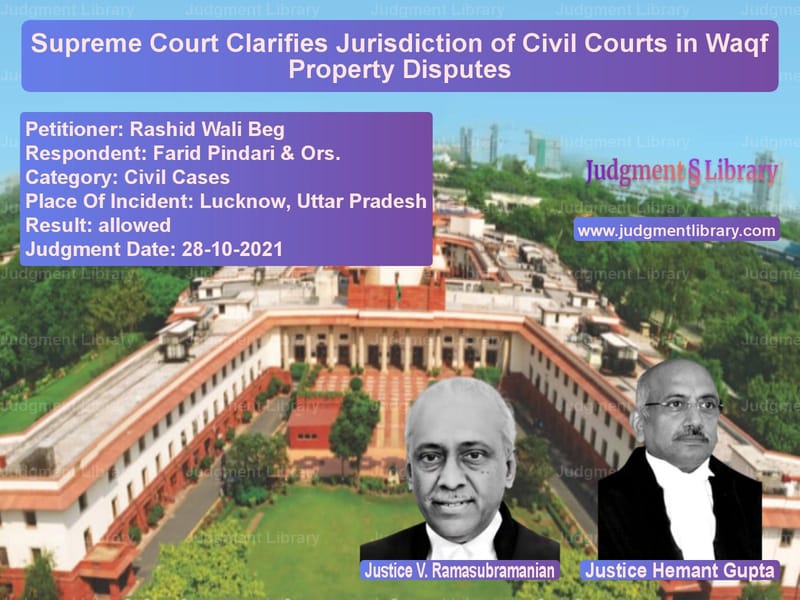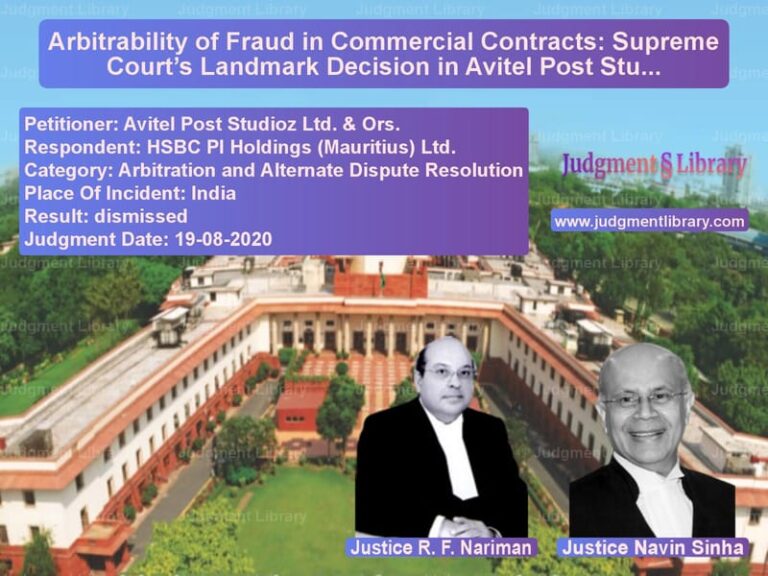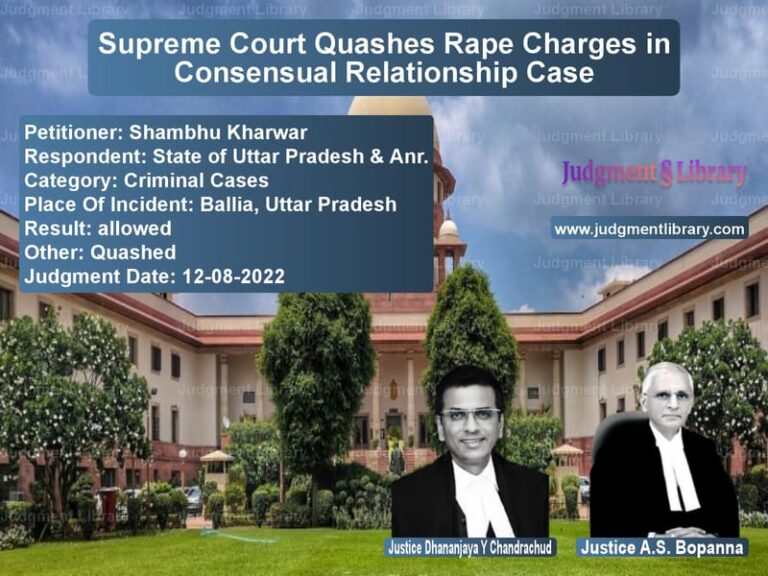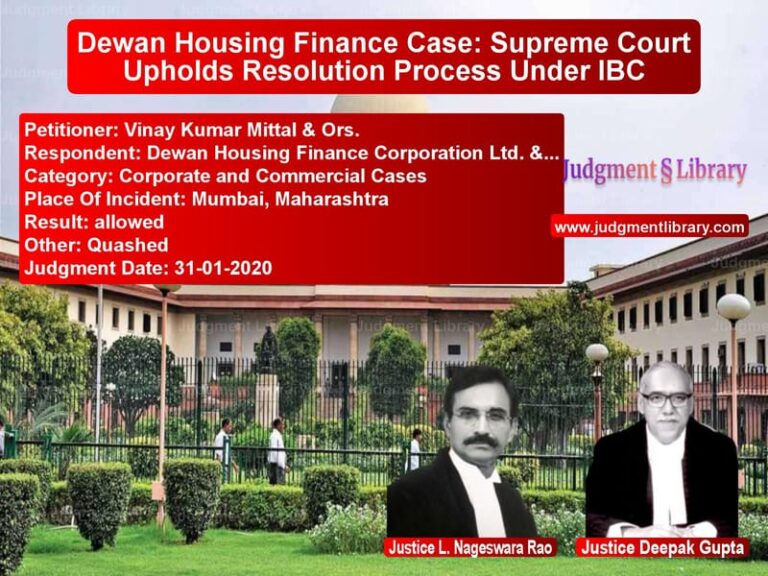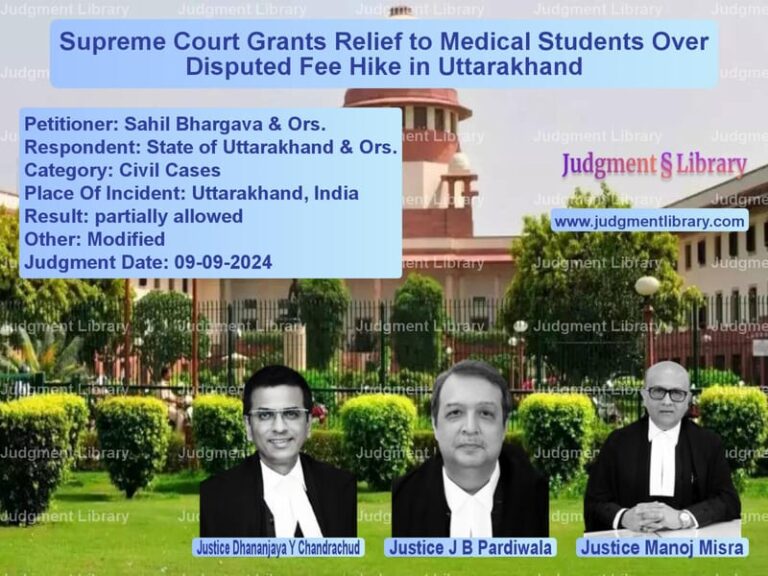Supreme Court Clarifies Jurisdiction of Civil Courts in Waqf Property Disputes
The Supreme Court of India in the case of Rashid Wali Beg vs. Farid Pindari & Ors. provided a crucial ruling on the jurisdiction of civil courts in waqf property disputes. The judgment examined the extent to which civil courts have authority over waqf-related matters under the Waqf Act, 1995, particularly in light of Sections 83 and 85 of the Act, which define the jurisdiction of the Waqf Tribunal.
The ruling has significant implications for property law, especially in cases involving religious endowments and the role of civil courts versus specialized tribunals in adjudicating such matters. This judgment reaffirms the exclusive jurisdiction of Waqf Tribunals over all matters concerning waqf properties.
Background of the Case
The dispute arose over a waqf property located in Lucknow, Uttar Pradesh. The plaintiff (respondent) had filed a suit before the civil court seeking a permanent injunction against the defendant (appellant), claiming that he was illegally interfering with the property.
The appellant challenged the jurisdiction of the civil court, arguing that under Sections 83 and 85 of the Waqf Act, the dispute should be decided by the Waqf Tribunal. However, the civil court proceeded with the matter, and the High Court subsequently ruled that a suit for injunction was maintainable before a civil court, as it did not involve determining the nature of the property as waqf land.
Aggrieved by this decision, the appellant approached the Supreme Court.
Legal Issues Before the Supreme Court
The main legal questions before the Supreme Court were:
- Whether a civil court has jurisdiction to entertain an injunction suit concerning waqf property.
- The interpretation of Sections 83 and 85 of the Waqf Act, 1995.
- Whether a dispute over possession or interference with waqf property falls within the exclusive jurisdiction of the Waqf Tribunal.
Arguments of the Parties
Petitioner’s (Appellant’s) Arguments
The appellant, Rashid Wali Beg, through his legal counsel, argued that:
- The property in question was an admitted waqf property.
- Under Section 85 of the Waqf Act, the jurisdiction of civil courts was completely barred for any matter concerning waqf properties.
- The High Court erred in holding that an injunction suit was maintainable before a civil court.
- The dispute should have been adjudicated by the Waqf Tribunal as per the legislative intent of the Waqf Act.
Respondents’ Arguments
The respondents contended that:
- The suit was purely for an injunction and did not involve deciding whether the property was a waqf property.
- The civil court retained jurisdiction as there was no dispute regarding the waqf status of the land.
- The Waqf Tribunal was not the appropriate forum since the case did not involve determination of title.
Supreme Court’s Observations and Ruling
The Supreme Court analyzed the statutory scheme of the Waqf Act, 1995, and made the following crucial observations:
1. Exclusive Jurisdiction of the Waqf Tribunal
The Court emphasized that the Waqf Tribunal has exclusive jurisdiction over all matters related to waqf properties. It stated:
“The jurisdiction of the civil court is barred under Section 85 of the Waqf Act. All disputes related to waqf property, including those concerning possession and injunction, fall within the purview of the Waqf Tribunal.”
2. Purpose of Sections 83 and 85 of the Waqf Act
The Court clarified that the legislative intent behind Sections 83 and 85 of the Act was to provide a specialized forum for resolving waqf disputes efficiently. It held:
“Sections 83 and 85 of the Waqf Act are designed to eliminate multiplicity of litigation and ensure that all matters related to waqf property are adjudicated by the Waqf Tribunal.”
3. Injunction Suits Also Fall Under Waqf Tribunal’s Jurisdiction
The Court rejected the argument that an injunction suit could be entertained by a civil court, noting:
“An injunction suit concerning waqf property necessarily involves the rights of the waqf and its management. Such matters must be decided by the Tribunal, not the civil court.”
4. Reaffirmation of Precedents
The judgment relied on earlier rulings such as:
- Board of Waqf, West Bengal v. Anis Fatima Begum – which held that civil courts do not have jurisdiction over waqf matters.
- Ramesh Gobindram v. Sugra Humayun Mirza Waqf – which clarified that matters related to waqf property disputes should be dealt with by the Waqf Tribunal.
Final Judgment
The Supreme Court set aside the High Court’s judgment and ruled that the civil court lacked jurisdiction in the matter. It directed that the case be transferred to the Waqf Tribunal for adjudication.
Key Takeaways from the Judgment
- Civil courts do not have jurisdiction in waqf property disputes.
- All waqf-related cases, including those for injunctions, must be heard by the Waqf Tribunal.
- The Waqf Act was enacted to provide a dedicated forum for resolving disputes involving waqf properties.
- Legislative intent behind Sections 83 and 85 is to prevent conflicting decisions from civil courts.
Conclusion
This ruling is a significant step in strengthening the autonomy of Waqf Tribunals and ensuring that disputes over waqf properties are resolved efficiently in a specialized forum. It prevents unnecessary litigation in civil courts and reinforces the legal framework of the Waqf Act, 1995.
Judges: The judgment was delivered by V. Ramasubramanian and Hemant Gupta.
Petition Result: Allowed
Petitioner Name: Rashid Wali Beg.Respondent Name: Farid Pindari & Ors..Judgment By: Justice V. Ramasubramanian, Justice Hemant Gupta.Place Of Incident: Lucknow, Uttar Pradesh.Judgment Date: 28-10-2021.
Don’t miss out on the full details! Download the complete judgment in PDF format below and gain valuable insights instantly!
Download Judgment: rashid-wali-beg-vs-farid-pindari-&-ors.-supreme-court-of-india-judgment-dated-28-10-2021.pdf
Directly Download Judgment: Directly download this Judgment
See all petitions in Property Disputes
See all petitions in Specific Performance
See all petitions in Judgment by V. Ramasubramanian
See all petitions in Judgment by Hemant Gupta
See all petitions in allowed
See all petitions in supreme court of India judgments October 2021
See all petitions in 2021 judgments
See all posts in Civil Cases Category
See all allowed petitions in Civil Cases Category
See all Dismissed petitions in Civil Cases Category
See all partially allowed petitions in Civil Cases Category

